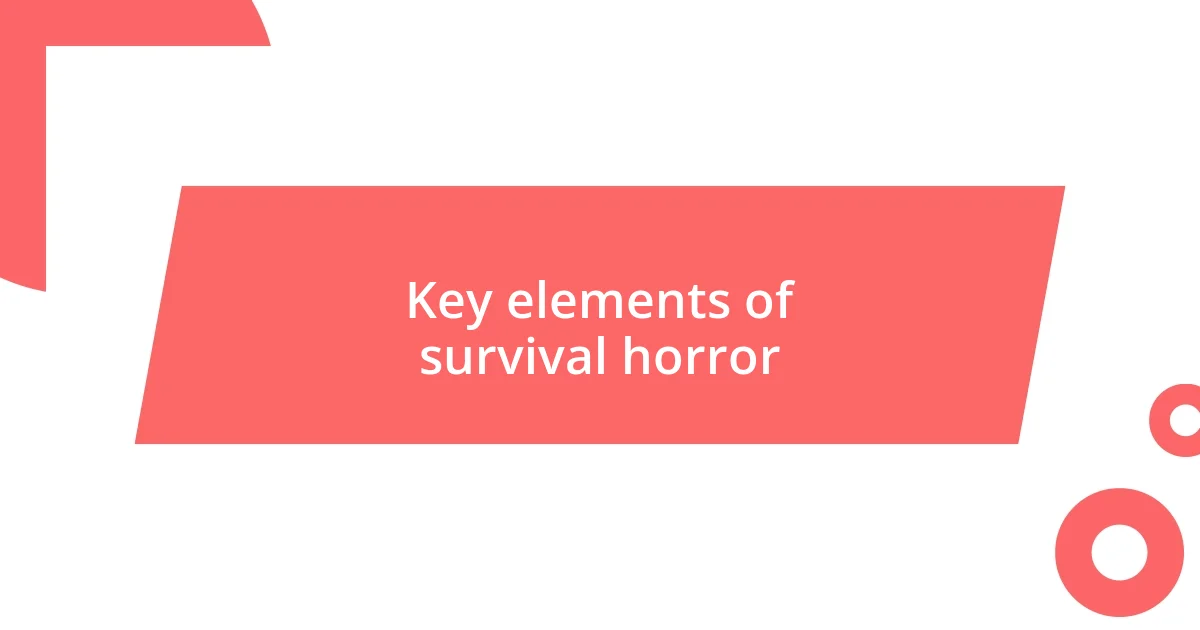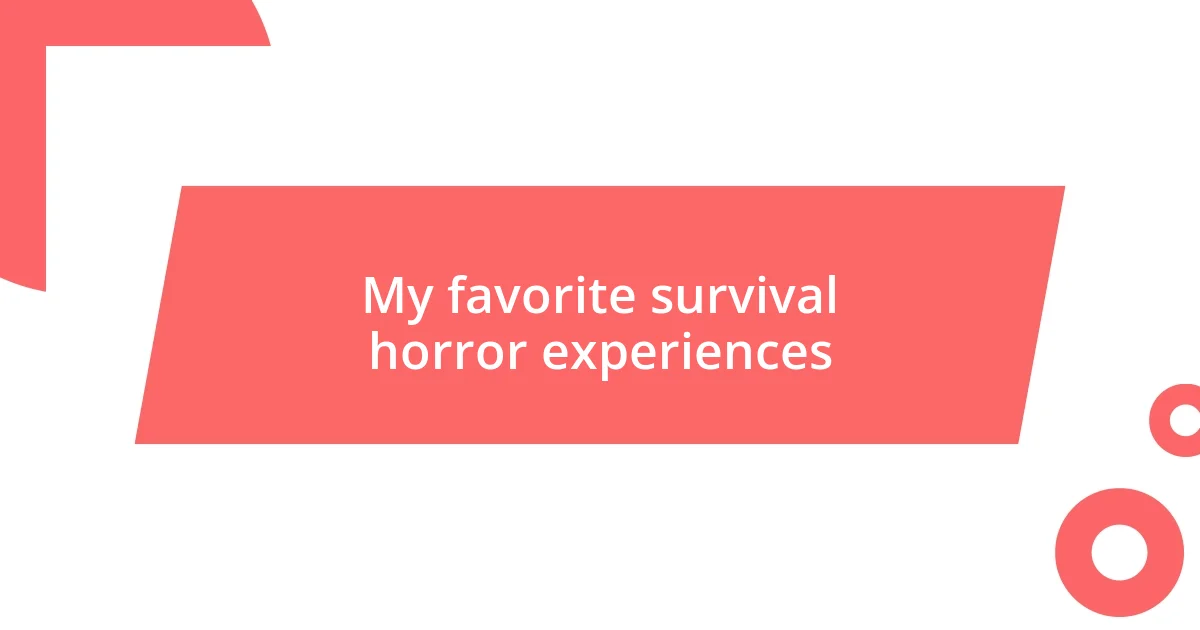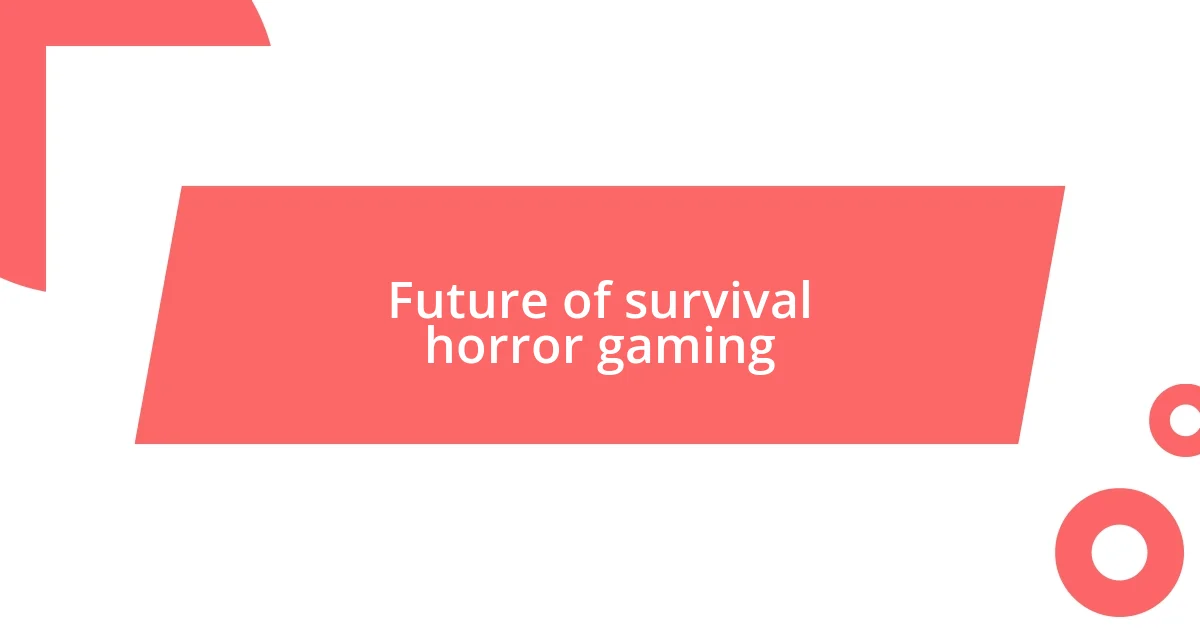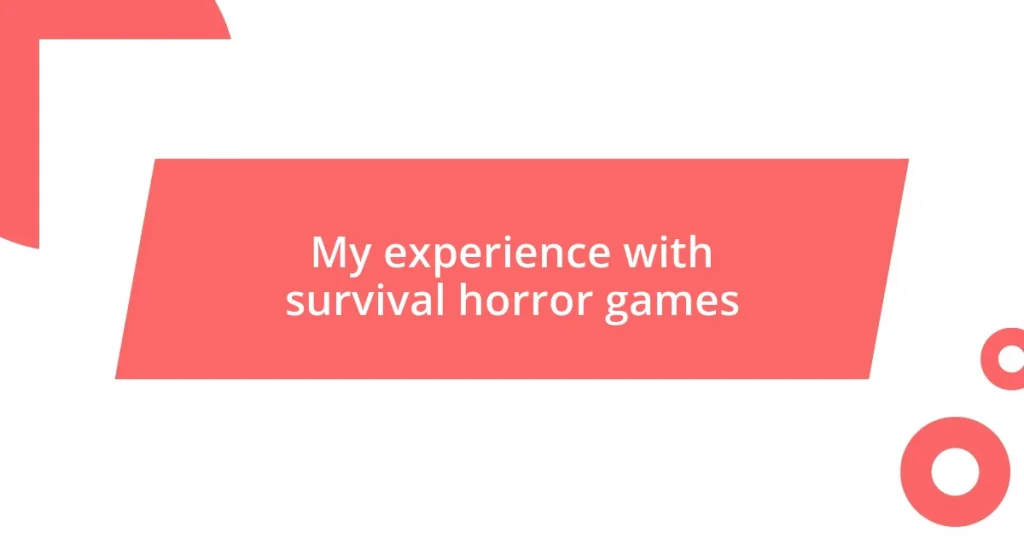Key takeaways:
- Atmosphere, resource management, and unpredictable enemies are crucial elements that define the survival horror genre, creating tension and emotional engagement for players.
- Personal experiences with games like *Silent Hill 2*, *Resident Evil 7*, and *Amnesia: The Dark Descent* highlight powerful psychological themes and intense survival scenarios that enhance the horror experience.
- The future of survival horror is promising with advancements in technology (like VR), deeper narratives, and innovative approaches from indie developers, providing fresh and immersive experiences.

Key elements of survival horror
Atmosphere is essential in survival horror games; for me, it’s what hooks you the moment you start playing. Think back to the eerie sound of creaking floors or the distant growl of an unseen creature. It creates a tension that keeps your heart racing—does anyone else feel that chill crawling down their spine when the lights flicker?
Then, there’s resource management, which adds an extra layer of anxiety. I vividly remember scavenging for bullets in an empty office space, knowing that I had to make every shot count. When I faced a horde of undead, my heart raced as I weighed my options: fight or flee? That feeling of vulnerability only heightens the horror, pushing me to make split-second decisions that could seal my fate.
Finally, unpredictable enemies are a hallmark of the genre. The first time I encountered a relentless creature that wouldn’t let up, I felt a mix of fear and exhilaration. It’s a terrifying dance—knowing that the moment you think you’ve figured them out, they change their tactics. Isn’t it fascinating how panic can transform mere pixels into a visceral threat?

My favorite survival horror experiences
I remember my first experience with Silent Hill 2. The moment I stepped into that fog-covered town, an overwhelming sense of dread washed over me. The haunting memories of James Sunderland’s search for Mary linger in my mind; the game’s psychological twists and haunting soundtrack truly shaped my appreciation for what survival horror could achieve. There was something profoundly unsettling about how the darkness could manifest not just through enemies, but through our own fears.
Then there was Resident Evil 7, which took a different approach by immersing me in the claustrophobic environment of the Baker family’s home. The sense of isolation gripped me; each unsettling creak of the floorboards felt personal. I distinctly recall gripping my controller as I was trapped in a room with Jack Baker, desperately brainstorming escape routes. The thrill of survival in such a terrifying setting transformed every encounter into a nail-biting moment that left me reflecting on the lengths I’d go to, just to breathe a little easier.
Another standout experience for me was Amnesia: The Dark Descent. Its unique emphasis on sanity was a game-changer. I recall creeping through the dark halls, my lantern flickering and my heart racing at every sound. The constant fear of the unseen monster lurking behind me pushed my anxiety to new heights, forcing me to confront my own limits. Isn’t it fascinating how a game can evoke such raw emotions, blurring the lines between reality and digital horror?
| Game Title | Memorable Experience |
|---|---|
| Silent Hill 2 | Exploring the fog-covered town and facing psychological fears |
| Resident Evil 7 | Trapped in Baker’s home, crafting escape routes under pressure |
| Amnesia: The Dark Descent | Creeping through dark halls and battling sanity in fear of the unseen |

Future of survival horror gaming
As I ponder the future of survival horror gaming, I can’t help but feel excited about the advancements in technology. Imagine how virtual reality (VR) could redefine the horror experience. Just think about the palpable dread I could feel standing in a game world, facing my fears eye-to-eye. It adds a whole new dimension to immersion that traditional screens simply can’t replicate, doesn’t it?
Moreover, narrative depth is evolving. Games are prioritizing storytelling alongside jump scares, leading to richer, more emotionally-driven plots. I’ve found myself feeling connected to characters in ways I never anticipated, experiencing their terror almost as if it were my own. How can we not look forward to storytellers harnessing this potential to craft intricate tales filled with psychological twists and moral dilemmas?
Lastly, the rise of indie developers is bringing a fresh wave of creativity. These smaller studios often take bold risks that mainstream titles shy away from. I remember playing an indie horror title that surprised me with its unique approach to gameplay and atmosphere. With this diversity, the genre can continue to surprise and terrify us, keeping horror enthusiasts on the edge of their seats. Who wouldn’t want to see what nightmares they’ll conjure next?















